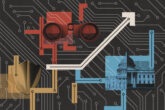August 04, 2024
The 1960s Novella That Got AI (Mostly) Right
A secret military project. A vast artificial mind. Questions of consciousness. These form the premise of Dino Buzzati’s The Singularity, originally published in 1960 at the dawn of the field of artificial intelligence (AI). The novella follows Italian scientist Ermanno Ismani, summoned by the Ministry of Defense to work on a top-secret project, as he ventures with his wife, Elisa, to a sprawling machine hidden in the mountains of the Italian countryside. The machine’s intelligence far surpasses that of humans—and its creators claim that the machine has come alive.
The reality is that AI systems won’t have to break out and take over civilization; they are already connected to the internet and increasingly embedded in our lives.
Written a half-century before the deep-learning revolution, much of the technology in The Singularity is delightfully retro, calling back to the early Cold War era of secret military projects, atomic weapons, and computers that filled entire rooms and ran on punch cards. Yet Buzzati’s prescient story, told in a new translation by Anne Milano Appel, is buzzing with many issues that society still grapples with today. Namely, Buzzati’s characters struggle to grasp the magnitude and consequences of the machine they have built.
Read the full article and more from Foreign Policy.
More from CNAS
-
Technology & National Security
CNAS Insights | Unpacking the H200 Export PolicyAI Chips for China With two new policies, President Donald Trump has implemented his pledge to allow sales of NVIDIA’s H200 AI chips to China in exchange for a quarter of the ...
By Janet Egan & James Sanders
-
Technology & National Security
CNAS Insights | The Export Control Loophole Fueling China's Chip ProductionThis week, Reuters reported that China has apparently built a prototype of an extreme ultraviolet lithography (EUV) system, a highly intricate machine used to produce cutting-...
By Michelle Nie, Autumn Dorsey & Janet Egan
-
Energy, Economics & Security / Technology & National Security
Recommendations for Promoting American AI AbroadStrategic Context and Program Objectives The American AI Exports Program is an ambitious and essential proposal to expand the reach of American AI technologies in foreign mar...
By Janet Egan, Geoffrey Gertz, Daniel Remler & Ruby Scanlon
-
Technology & National Security
Prepared, Not ParalyzedExecutive Summary The Trump administration has embraced a pro-innovation approach to artificial intelligence (AI) policy. Its AI Action Plan, released July 2025, underscores t...
By Janet Egan, Spencer Michaels & Caleb Withers




